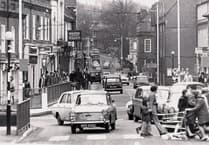It began in 1881, in the cozy confines of The Hare and Hounds pub in Rowledge.
A group of local men gathered, driven by a shared frustration. The nearby Alice Holt Forest, a Crown-owned expanse rich in natural beauty and practical pathways, had become increasingly inaccessible due to blocked rights of way.
The meeting, fuelled by ale and indignation, resulted in a resolution: a small group was selected to traverse the paths the following day and remove the obstructions, legally advised and determined to reclaim public access.
This early effort was just the beginning. The issue of public access to Alice Holt simmered for decades, flaring up periodically as other disputes over rights of way erupted across the country.
By the late 19th century, such conflicts were becoming increasingly common and in 1899, Haslemere man Sir Robert Hunter co-founded the Open Spaces Society to protect the nation’s public rights of way.
Famous locally, the 1897 ‘Battle of Moor Park’ had seen local residents force open gates blocking a public path near Farnham, ensuring it was never closed again.
Alice Holt’s troubles escalated dramatically in 1911, during a nationwide surge of disputes over footpaths. On May 5, the Farnham Herald reported a ‘forceful demonstration’ had taken place the previous Sunday morning.
Residents of Rowledge and Bucks Horn Oak had gathered to protest the closure of a path leading through the demesne of Alice Holt Lodge, which provided a convenient route to Bentley Station. The lodge’s lessee, Mr WM Robertson, had chained and padlocked four gates, determined to keep the public out.

But the locals were equally determined. Undeterred by the chains, they broke them all and surged through, asserting their claim to the path. It was a bold act of defiance, part of a broader movement challenging landowners’ efforts to restrict public access across England.
The protest forced the issue into the open. The following week, representatives from Binsted Parish Council met with Sir Stafford Howard, head of His Majesty’s Office of Woods and Forests.
Sir Stafford firmly asserted that the disputed path, which ran close to the windows of Alice Holt Lodge, was private and not a public right of way.
He warned against any misconceptions that Crown property was freely accessible, emphasising the importance of distinguishing between public and private paths.
Despite his stern stance, a compromise was reached. The public pathways were diverted slightly away from the lodge, preserving privacy for the estate’s residents while still allowing locals access to the forest. Crucially, the adjustments came at no cost to the parish council.
Unlike the more confrontational conclusion of the Battle of Moor Park, this resolution showcased a quintessentially British compromise, leaving all parties reasonably satisfied.
Though the ‘Battle of Alice Holt’ ended in a negotiated settlement, the spirit of the protestors lived on. Over the decades, public access to Alice Holt Forest has not only been preserved but expanded.
The lodge, once a symbol of exclusion, is now home to Forest Research, a hub of scientific exploration and ecological study. Far from limiting access, the surrounding forest has become more welcoming than ever.
In recent years, new amenities have been created to enhance public enjoyment of Alice Holt’s natural beauty. As well as the visitor centre with its cornucopia of family activities and cafe, the Alice Holt Arboretum, accessible via the footpath to Bentley Station close to the 1911 battleground, invites visitors to explore an extraordinary collection of trees.
Forest Research’s Alice Holt Adaptation Trail also offers an educational journey through the forest, highlighting its resilience to climate change.
The Battle of Alice Holt, with its forceful demonstrations and hard-won compromises, reminds us of the importance of standing up for shared rights while balancing the needs of all stakeholders.
So, next time you walk through Alice Holt Forest, spare a thought for the determined locals who broke chains and barriers to pave the way - literally - for the freedoms we enjoy today.






.png?width=209&height=140&crop=209:145,smart&quality=75)